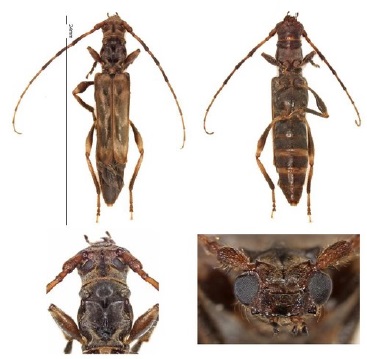Dangerous insects, long-horned beetles, grain weevils found in shipments headed to East Coast
The U.S. Department of Agriculture (USDA) confirmed today that two insects that U.S. Customs and Border Protection (CBP) agriculture specialists discovered during June were first ever discoveries of those species in the Port of Wilmington.

On June 4, CBP agriculture specialists intercepted an adult long-horned beetle in a container of cassava from Costa Rica that was destined to Port Washington, N.Y. CBP preserved and submitted the pest to a USDA entomologist for identification. The following day, the entomologist identified the insect as Ozodes multituberculatus Bates 1870 (Cerambycidae), a pest of Central America. Long-horned beetles bore into wood and cause extensive damage to trees, particularly crop and lumber trees.
On June 11, CBP agriculture specialists intercepted an adult weevil in a container of pineapples from Guatemala that was destined to Wilmington. CBP preserved and submitted the pest to a USDA entomologist for identification. The following day, the entomologist identified the insect as Amalactus sp. (Curculionidae), a pest of Central and South America. Weevils pose a threat to a wide variety of foodstuffs, including grains and crops.
In both cases, the USDA directed the importer to fumigate the container.
“Customs and Border Protection’s agriculture protection mission is vital to our nation’s economic health, and these two first-in-port discoveries are evidence of our agriculture specialists’ tireless efforts to carry out that critical mission,” said Casey Durst, CBP Director of Field Operations in Baltimore. “CBP remains steadfastly committed to ensuring our agriculture industries remain vibrant by intercepting invasive insects, noxious weeds, and animal diseases when we encounter them at our nation’s 328 international ports of entry.”
CBP agriculture specialists have extensive training and experience in the biological sciences and agricultural inspection.
On a typical day nationally, they inspect over 1 million people as well as land, air and sea cargo imported to the United States, and intercept 319 agriculture pests and 4,552 prohibited meat, plant materials or animal products. Learn what else CBP accomplished during a Typical Day in 2018.
CBP is presently accepting applications to fill agriculture specialist positions across the United States, including here in the Delaware Valley.
Learn more about CBP’s agriculture protection mission. Learn more about CBP.gov.















